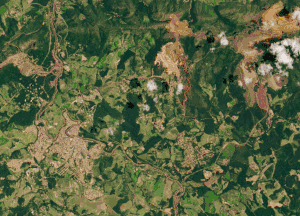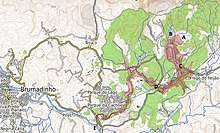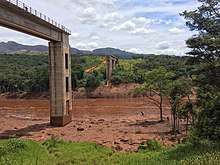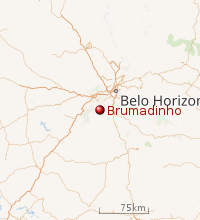Brumadinho dam disaster
The Brumadinho dam disaster occurred on 25 January 2019 when Dam I, a tailings dam at the Córrego do Feijão iron ore mine, 9 kilometres (5.6 mi) east of Brumadinho, Minas Gerais, Brazil, suffered a catastrophic failure.[1] The dam is owned by Vale, the same company that was involved in the 2015 Mariana dam disaster.[2] The dam released a mudflow that advanced through the mine's offices, including a cafeteria during lunchtime, along with houses, farms, inns and roads downstream.[3][4][5][6] 270 people died as a result of the collapse, of whom 259 were officially confirmed dead, in January 2019, and 11 others reported as missing, whose bodies had not been found.[7][8]
.jpg) | ||
| Date | 25 January 2019 | |
|---|---|---|
| Location | Córrego do Feijão iron ore mine, Brumadinho, Minas Gerais, Brazil | |
| Coordinates | 20°07′11″S 44°07′17″W | |
| Type | Dam failure | |
| Participants | Vale | |
| Deaths | 259 | |
| Missing | 11 | |
| Arrests | 13 | |
| ||
Background
According to the national registry of the National Mining Agency, the Córrego do Feijão dam, built in 1976 by the Ferteco Mineração and acquired by the iron ore miner Vale in 2001, was classified as a small structure with low risk of high potential damage. In a statement, the State Department of Environment and Sustainable Development reported that the venture was duly licensed. In December 2018, Vale obtained a license to reuse waste from the dam (about 11.7 million cubic meters) and to close down activities. The dam had not received tailings since 2014 and, according to the company, underwent bi-weekly field inspections.[9]
Vale SA knew that sensors monitoring the dam's structural integrity had problems.[10]
Mariana dam disaster
The Brumadinho dam failure occurred three years and two months after the Mariana dam disaster from November 2015, which killed 19 people and destroyed the village of Bento Rodrigues. The Mariana disaster is considered the worst environmental disaster in Brazil's history and as of January 2019 was still under investigation.[11] According to experts Brazil's weak regulatory structures and regulatory gaps allowed the Mariana dam's failure.[12] Three years after the Mariana dam collapse, the companies involved in that environmental disaster have paid only 3.4% of R$785 million in fines.[12] In November 2015, the department in charge of inspecting mining operations in the state of Minas Gerais, the National Department of Mineral Production (DNPM), was worried about the retirement of another 40% of public employees over the course of the next two years.[13]
Collapse



The collapse occurred just after noon. The mud hit the mine's administrative area, where hundreds of the mine's employees were having lunch, as well as the "Vila Ferteco", a small community about 1 kilometre from the mine. At 3:50 p.m., the mud reached the Paraopeba River, the region's main river, which supplies water to one third of the Greater Belo Horizonte region.[14][15]
The Inhotim Institute, the largest open-air museum in the world, which is located in Brumadinho, was evacuated as a precaution.[16]
On 27 January, around 5:30 a.m., sirens were sounded amid fears for the stability of the mine's adjacent Dam VI, a process water reservoir, where increased water levels were detected. Due to the risk, about 24,000 residents from several districts of Brumadinho were evacuated, including the city's downtown area. Rescue operations were suspended for several hours.[17][15][18]
Aftermath
Victims
On January 26, 2019, Vale's president, Fabio Schvartsman, stated that most of the victims are Vale's employees. Three locomotives and 132 wagons were buried and four railwaymen were missing. The mud destroyed two sections of railway bridge and about 100 metres of railway track.[19] As of January 2020, 259 people were confirmed dead, and 11 were considered missing.[7] Figures were later amended to 270 deaths.[20]
Environment

The dam failure released around 12 million cubic meters of tailings. According to experts, the metals in the tailings will likely be incorporated into the river's soil and could go on to affect the region's whole ecosystem. According to environmentalists, the waste stream could also reach the São Francisco River which – in addition to Minas Gerais – passes through four other Brazilian states and the dams of two hydroelectric plants: Retiro Baixo and Três Marias.
The National Water Agency (ANA) stated that the tailings could pollute over 300 kilometres of river. Vale's president, Fabio Schvartsman, said that the dam had been inactive since 2015 and that the material should not be moving too much. "I believe that the environmental risk, in this case, will be much lower than that of Mariana", he said.[21]
Economic impact
As a result of the disaster, on 28 January the Vale S.A. stock price fell 24%, losing 71.3 billion reais (US$19 billion) in market capitalization, the biggest single day loss in the history of the Brazilian stock market, surpassing May 2018, when Petrobrás lost more than R$47 billion in market value. At the end of January 28, Vale's debt was downgraded to a rating of BBB- by Fitch Ratings.[22]
In the city of Brumadinho, many agricultural areas were affected or totally destroyed. The local livestock industry suffered damages, mainly from loss of animals such as cattle and poultry. The local market was also impacted due to the damages, with some stores and establishments remaining closed for a few days.
Reactions
The President of Brazil, Jair Bolsonaro, sent three ministers to follow the rescue efforts.[23] The Governor of Minas Gerais, Romeu Zema, announced the formation of a task force to rescue the victims with dozens of firefighters reallocated to Brumadinho.[24]
In a sign of solidarity with the Brazilian government, the Prime Minister of Israel Benjamin Netanyahu sent a search and rescue group of 130 civil defense specialists and navy divers to Brumadinho to aid Brazilian specialists in finding possible survivors.[25][26][27]
On January 29, Brazilian authorities issued arrest warrants for five employees believed to be connected with the dam collapse, leading to two senior managers of the mine and another Vale employee being arrested, alongside two engineers from the German company TÜV Süd who had been contracted to inspect the dam.[28][29][30]
The local mining union's treasurer called the disaster "premeditated" as there were continuous and long-standing complaints and warnings about the structural integrity of the dam. Vale denied these charges and stated the mine was up-to-date with the latest standards.[29]
One day after the failure, the Brazilian Institute of Environment and Renewable Natural Resources announced a R$250 million fine on the Vale company.[31]
Brazilian judicial authorities froze US$3 billion of Vale's assets, saying real estate and vehicles would be seized if the company could not come up with the money.[32]
In April, Vale's safety inspectors refused to guarantee the stability of at least 18 of its dams and dikes in Brazil.[33]
Brazilian prosecutors announced, on January 21, 2020, that Vale SA, auditor TÜV Süd, and 16 individuals would be charged.[34]
A global database of mine tailing storage facilities and associated disclosures was announced by GRID-Arendal through the support of the UN Environment Program[35] The database enables users to examine information disclosures on tailings dams by location, company, dam type, height, volume, and risk, among other factors.[36]
See also
References
- Schvartsman, Fabio (25 January 2019). "Announcement about Brumadinho breach dam" (in Portuguese). Vale. Retrieved 26 January 2019.
- "Barragem de rejeitos da Vale se rompe e causa destruição em Brumadinho (MG)" [Vale's tailings dam collapses and causes destruction in Brumadinho, Minas Gerais]. Correio Braziliense (in Portuguese). 25 January 2019. Retrieved 25 January 2019.
- Phillips, Dom (6 February 2019). "'That's going to burst': Brazilian dam workers say they warned of disaster". The Guardian. London. Retrieved 1 May 2019.
- "Clarifications regarding Dam I of the Córrego do Feijão Mine". Vale. Retrieved 27 January 2019.
- "Barragem da Vale se rompe em Brumadinho, na Grande BH" [Vale's tailings dam collapses in Brumadinho, in Belo Horizonte metropolitan area of Belo Horizonte]. G1 (in Portuguese). 26 January 2019. Retrieved 26 January 2019.
- "Brumadinho dam collapse in Brazil: Vale mine chief resigns". Retrieved 3 March 2019.
- Exclusive: Brazil prosecutor aims to charge Vale within days over mining waste dam disaster
- "Brumadinho: mais duas vítimas do rompimento da barragem da Vale são identificadas". G1 Minas (in Portuguese). Belo Horizonte, Brazil. 28 December 2019. Retrieved 12 January 2020.
- "Brumadinho: O que se sabe sobre o rompimento de barragem que matou ao menos 58 pessoas em MG". BBC Brasil (in Portuguese). Retrieved 28 January 2019.
- "Vale knew about sensor problems at dam before burst – Globo TV". Mining.com. 16 February 2019. Retrieved 26 November 2019.
- "Tragédia em Brumadinho acontece três anos após desastre ambiental em Mariana". Jornal Nacional. Retrieved 27 January 2019.
- "Empresas envolvidas em desastres ambientais quitaram só 3,4% de R$ 785 milhões em multas". O Globo (in Portuguese). 6 May 2018. Retrieved 26 January 2019.
- "Minas tem apenas quatro fiscais para vistoriar barragens e não há previsão de concurso". Estado de Minas (in Portuguese). 19 November 2015. Retrieved 26 January 2019.
- "Tragédia em Brumadinho: 58 mortes confirmadas, 19 corpos identificados, lista tem 305 pessoas sem contato; SIGA". G1 (in Portuguese). Retrieved 28 January 2019.
- "Brazil dam rescue resumes after second barrier ruled safe", Sky.
- Rebello, Aiuri; Ramalhoso, Wellington. "Barragem se rompe em Brumadinho e atinge casas; vítimas são levadas a BH" [Dam collapses in Brumadinho and hits homes; victims are taken to Belo Horizonte]. UOL (in Portuguese). Retrieved 26 January 2019.
- "Brazil search resumes after new dam scare". 27 January 2019. Retrieved 27 January 2019 – via www.bbc.com.
- "Vale updates information on the dam breach in Brumadinho". Vale. 27 January 2019. Retrieved 8 February 2019.
- "Tragédia em Brumadinho:Lista da Vale de pessoas não encontradas". G1 (in Portuguese). Belo Horizonte, Brazil. 26 January 2019. Retrieved 23 February 2019.
- "Brazil’s Vale Vowed ‘Never Again.’ Then Another Dam Collapsed." by Samantha Pearson, et al, The Wall Street Journal, December 31, 2019. Retrieved January 21, 2020.
- "Técnicos avaliam extensão do dano ambiental de rompimento da barragem". Jornal Nacional (in Portuguese). 26 January 2019. Retrieved 28 January 2019.
- Laier, Paula (28 January 2019). "Vale stock plunges after Brazil disaster; $19 billion in market value lost". Reuters. Retrieved 30 January 2019.
- Ernesto, Marcelo. "Em mensagem, Bolsonaro lamenta rompimento de barragem em Brumadinho" [In a message, Bolsonaro mourned the tailings dam collapse in Brumadinho]. Estado de Minas (in Portuguese). Retrieved 26 January 2019.
- da Fonseca, Marcelo. "Governo de Minas cria força-tarefa para acompanhar barragem de Brumadinho" [Minas Gerais government creates task-force to monitor Brumadinho's dam]. Correio Braziliense (in Portuguese). Retrieved 26 January 2019.
- Oliveira, Eliane (27 January 2019). "Militares de Israel que ajudarão nas buscas em Brumadinho embarcam para o Brasil". O Globo (in Portuguese).
- Roberto, Jose. "Israel posta imagens dos militares que ajudarão em Brumadinho". VEJA.com (in Portuguese).
- staff, T. O. I.; AP. "Israeli rescue team arrives in Brazil as dam collapse toll hits 58". timesofisrael.com. Retrieved 28 January 2019.
- "Brazil dam disaster death toll mounts as arrests warrants issued". 29 January 2019.
- Jan 29, Thomson Reuters · Posted; January 29, 2019 10:25 AM ET | Last Updated. "3 Brazil mining company employees, 2 contractors arrested in dam disaster | CBC News". CBC. Retrieved 30 January 2019.
- Silva De Sousa, Marcelo; Jeantet, Diane (31 January 2019). "Brazilian environmental group tests water after dam collapse". Retrieved 1 February 2019.
- "Ibama multa Vale em R$ 250 milhões por tragédia em Brumadinho". noticias.uol.com.br (in Portuguese). Retrieved 26 January 2019.
- "New alert as hundreds feared dead in Brazil dam disaster". São Paulo. Agence France-Presse. 27 January 2019. Retrieved 28 January 2019.
- MarketScreener, Samantha Pearson and Luciana Magalhaes (1 April 2019). "Inspectors Fail to Guarantee Safety of 18 Vale Dams, Dikes in Brazil -- 2nd Update". Retrieved 26 November 2019.
- "Brazil to File Charges on Tuesday Against Miner Vale for Dam Disaster", by Luciano Costa, Reuters via The New York Times, January 21, 2020. Retrieved January 21, 2020.
- Editor, Mining (24 January 2020). "Global database of mine tailing storage facilities | Mine Safety News". Australasian Mine Safety Journal. Retrieved 25 January 2020.CS1 maint: extra text: authors list (link)
- "Global Tailings Portal". tailing.grida.no. Retrieved 25 January 2020.
External links
- The safety business: TÜV SÜD's role in the Brumadinho dam failure in Brazil European Center for Constitutional and Human Rights (ECCHR), 17 October 2019, accessed 26 November 2019
- Emiuly Pollock (18 February 2019). "Manufactured Disaster: How Brazil's Dam Collapse Should Have Been Avoided". Engineering.com. Retrieved 26 November 2019.
- Burton, Katie (20 March 2019). "Why the Brumadinho dam collapse wasn't surprising". Geographical Magazine. Retrieved 26 November 2019.

- "Brazil dam disaster: Inside the village destroyed by surging sludge", by Julia Carneiro BBC News Brasil, Brumadinho, Brazil, BBC News, British Broadcasting Corporation, January 31, 2019. Retrieved February 10, 2019. (Córrego do Feijão village.)
